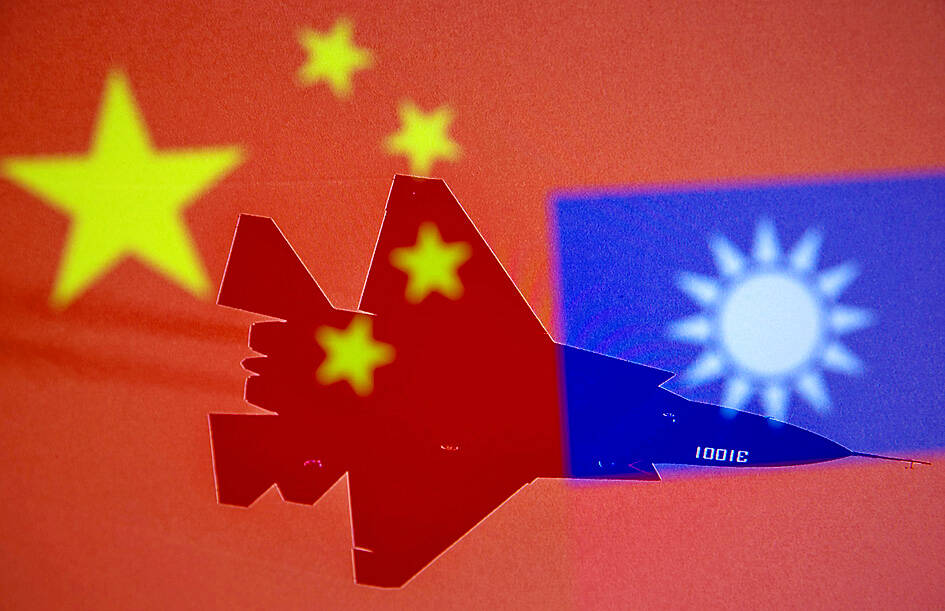Two Chinese aircraft yesterday crossed the median line of the Taiwan Strait, the Ministry of National Defense said, as Beijing continues its military maneuvers near the nation.
Although not an internationally recognized delineation, the median line had been tacitly accepted by both sides since the 1950s.
On Sunday, two Chinese fighter jets and an uncrewed aerial vehicle also crossed the median line, the ministry said.

Photo: Reuters
The three aircraft were among eight that were detected around Taiwan that day, along with five Chinese naval ships, it added.
Two Shenyang J-11 fighters crossed the median line near northern Taiwan, while a KVD-001 drone crossed the line further north, it said.
Separately on Sunday, a Y-8 tactical reconnaissance plane and a Guizhou BZK-007 drone entered the southwestern part of Taiwan’s air defense identification zone (ADIZ), it added.
The ministry did not disclose the flight paths of the aircraft or the locations of the naval vessels.
The military scrambled fighter jets and naval vessels, and tracked the Chinese aircraft with surface-to-air missile systems, the ministry said.
The ministry has since September last year been publishing information about Chinese incursions into Taiwan’s ADIZ, amid a growing number of intrusions.
China stepped up its military maneuvers early last month and held live-fire drills in six locations around Taiwan, shortly after a visit to Taipei by US House of Representatives Speaker Nancy Pelosi.
Since then, dozens of Chinese warplanes, including 14 on Thursday, have crossed the median line.
Additional reporting by Reuters

Taiwan has received more than US$70 million in royalties as of the end of last year from developing the F-16V jet as countries worldwide purchase or upgrade to this popular model, government and military officials said on Saturday. Taiwan funded the development of the F-16V jet and ended up the sole investor as other countries withdrew from the program. Now the F-16V is increasingly popular and countries must pay Taiwan a percentage in royalties when they purchase new F-16V aircraft or upgrade older F-16 models. The next five years are expected to be the peak for these royalties, with Taiwan potentially earning

POSITIVE DEVELOPMENT: Japan and the US are expected to hold in-depth discussions on Taiwan-related issues during the meeting next month, Japanese sources said The holding of a Japan-US leaders’ meeting ahead of US President Donald Trump’s visit to China is positive news for Taiwan, former Japan-Taiwan Exchange Association representative Hiroyasu Izumi said yesterday. After the Liberal Democratic Party’s landslide victory in Japan’s House of Representatives election, Japanese Prime Minister Sanae Takaichi is scheduled to visit the US next month, where she is to meet with Trump ahead of the US president’s planned visit to China from March 31 to April 2 for a meeting with Chinese President Xi Jinping (習近平). Japan and the US are expected to hold in-depth discussions on Taiwan-related issues during the

‘LIKE-MINDED PARTNER’: Tako van Popta said it would be inappropriate to delay signing the deal with Taiwan because of China, adding he would promote the issue Canadian senators have stressed Taiwan’s importance for international trade and expressed enthusiasm for ensuring the Taiwan-Canada trade cooperation framework agreement is implemented this year. Representative to Canada Harry Tseng (曾厚仁) in an interview with the Central News Agency (CNA) said he was increasingly uneasy about Ottawa’s delays in signing the agreement, especially as Ottawa has warmed toward Beijing. There are “no negotiations left. Not only [is it] initialed, we have three versions of the text ready: English, French and Mandarin,” Tseng said. “That tells you how close we are to the final signature.” Tseng said that he hoped Canadian Prime Minister Mark Carney

STAY IN YOUR LANE: As the US and Israel attack Iran, the ministry has warned China not to overstep by including Taiwanese citizens in its evacuation orders The Ministry of Foreign Affairs (MOFA) yesterday rebuked a statement by China’s embassy in Israel that it would evacuate Taiwanese holders of Chinese travel documents from Israel amid the latter’s escalating conflict with Iran. Tensions have risen across the Middle East in the wake of US and Israeli airstrikes on Iran beginning Saturday. China subsequently issued an evacuation notice for its citizens. In a news release, the Chinese embassy in Israel said holders of “Taiwan compatriot permits (台胞證)” issued to Taiwanese nationals by Chinese authorities for travel to China — could register for evacuation to Egypt. In Taipei, the ministry yesterday said Taiwan